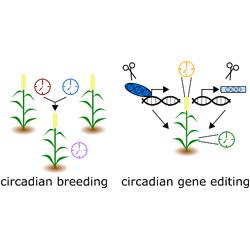Supervisor
Professor Alex Webb (Department of Plant Sciences) and Dr James Corckram (NIAB)
Brief Summary
This project investigates the molecular mechanisms by which wheat regulates the time to flower (heading). We have developed new approaches and tools to investigate the molecular mechanisms regulating this important biological pathway, which is poorly understood.
Importance of Research
Wheat is the UK’s largest crop by area. To meet the future needs of the UK, new germplasm must be identified that can be used in breeding programmes to adapt to increased demand and the change in local growing seasons resulting from climate change. We have identified some of the potential molecular mechanisms of one of the most important traits in crop biology, the photoperiodic regulation of flowering time. The molecular knowledge we will identify has the potential to provide new tools for wheat breeders.
Project Summary
Wheat is the UK’s largest crop by area. To meet the future needs of the UK, new germplasm must be identified that can be used in breeding programmes to adapt to increased demand and the change in local growing seasons resulting from climate change. The circadian oscillator is a regulator of the seasonal responses of wheat and therefore there is a need to understand to the basic biology of the circadian system in wheat to inform breeding strategies. Our new data suggest that the circadian oscillator of wheat has a different structure to that of Arabidopsis and that variation at circadian loci can affect to yield traits in the field. We have isolated over the last few years a population of wheat plants with mutations in the different genes that form part of the circadian oscillator. These mutants have shown that the molecular basis of the circadian oscillator in wheat is different to that in Arabidopsis. Particularly the ELF3 clock protein has a different role in wheat. In this project you will investigate why the structure of the circadian clock is different in wheat, you will determine the function of the ELF3 protein in the circadian clock and flowering time pathways of wheat.
What will the successful application do?
The successful candidate will use new genetic resources we have developed to investigate the role of the circadian clock in regulating flowering time in wheat. This will include analysis of the circadian biology of existing mutants that we have identified, isolating new mutants and performing molecular analysis, lab studies and potentially field experiments to understand how the circadian clock regulates flowering.
Training Provided
The student will receive training in wheat genetics, circadian biology, molecular biology and the pathway from research to field application.
References

